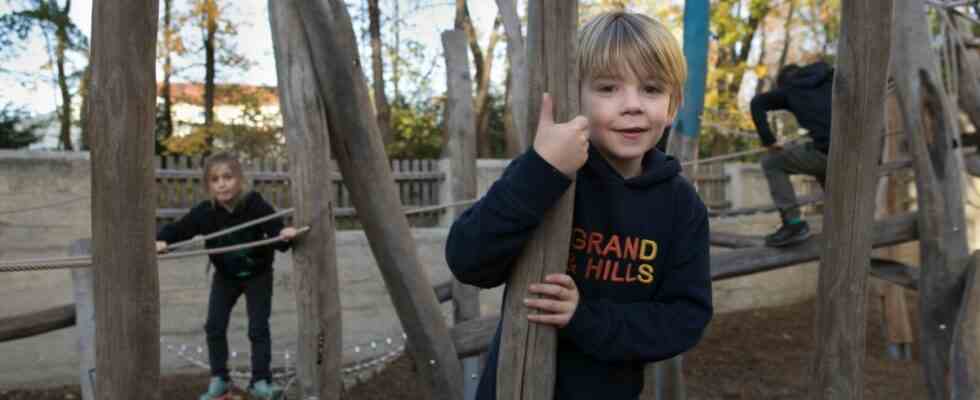In the basement of the elementary school on Schererplatz, things are bustling. Girls and boys dart from one room to the next, the “restaurants” – that’s what they call the dining rooms at school – are well frequented. It’s the last day of the autumn holidays, but the building is still open – for children from the cooperative all-day school.
This has been possible since 2019. The Pasing school was one of the first to offer the model project “Cooperative all-day education” in Munich. The KoGa, developed by the city and the Ministry of Education, is intended to ensure the legal entitlement to a childcare place for elementary school students after class, which will apply nationwide from 2026. The concept provides for flexible times up to 6 p.m. for children from regular and all-day classes, including holiday care. 26 elementary schools now offer the KoGa.
The idea itself is “excellent,” says Anita Bock, principal of the Pasing elementary school. What doesn’t fit, however, are the conditions: the lack of staff, the lack of space and the equipment. Around 250 children are currently using the KoGa on Schererplatz. They are looked after by six full-time and three part-time employees and one person who only supports on an hourly basis. “That’s far too little,” says Bock, “after all, the children should also be allowed to do projects and not just be in good hands.”
The educators “try to the best of their ability and have been going far beyond their limits for a long time to ensure a beautiful and stimulating environment for the children,” reports Daniela Klein, Chair of the KoGa Parents’ Advisory Board. But it is missing “at every corner and end”. In this way, “the great approach is slowly but surely becoming a storage facility”. If colleagues get sick, things get particularly tight. “In the first few weeks of this school year, afternoon care was completely canceled for some grade levels.”
This should get better now. After massive complaints from the school management and the parents’ council, the city has now moved. “A new manager was found for the cooperative all-day education,” explains the spokesman for the education department Andreas Haas, “and one position was changed so that the colleague can stay.” In addition, the city has “hired three new employees who will start in December or early 2023”.
Principal Anita Bock (left) and Daniela Klein, chairwoman of the KoGa Parents’ Council.
(Photo: Florian Peljak)
According to Daniel Gromotka, the situation in Pasing is not an isolated case. “We have received several reports of serious staff shortages at KoGas and would like a better staff ratio,” says the chairman of the joint parents’ advisory board for after-school care centers and day care centers in Munich. There is also little capacity for administrative tasks. Relieving the educational staff of administrative tasks would be a “possibility of reducing the problem of the lack of skilled workers in the educator field”.
The implementation of the KoGa also complicates another aspect: the lack of space. For years, the Schererplatz school has been bursting at the seams, the cooperative all-day education is already spread over three locations. The third and fourth graders registered in the KoGa have been accommodated at Am Klostergarten 13 since 2021 – that is positive, but “should only be an interim solution”. Because with the spatial separation you have “in principle no cooperative all-day education, but only an extended after-school care center”.
Rector Bock wants a sustainable concept. A little more than a year ago, the former chairman of the parents’ council, Leif Geuder, developed the vision of a “Campus Pasing” based on the forecasts for increasing student numbers. This is to receive an extension including a canteen, a swimming pool and new classrooms for the elementary school and the neighboring Elsa-Brändström-Gymnasium on the site of today’s dilapidated gymnasium. The city is examining the proposal, but so far no concrete results are available.
The lack of space is also typical for Munich’s schools for the parents’ council chairman Gromotka. The buildings are “often planned too small”. Example Schrobenhausener Straße in Laim: The primary school has five classes, but the new building opened in 2020 was designed for fewer classes. The result: “The KoGa is already having space problems, although it has only just reached 75 percent of its maximum capacity.” Indoor and outdoor spaces are needed that are suitable for moving, playing and hiding and have the appropriate equipment – unlike in Laim, where the draft initially did not provide for outdoor play equipment. Or like in Pasing, where the children at the monastery garden have been hoping for months to find more than an asphalt courtyard, which their parents have already called the “prison yard”. After all: The playground equipment has now been confirmed.
From the point of view of the joint parents’ council, separate budgets for the KoGas could help with the equipment, so that the schools can also implement projects unbureaucratically. Although the municipality usually approves requested requests, this takes time. time that is often lacking.

